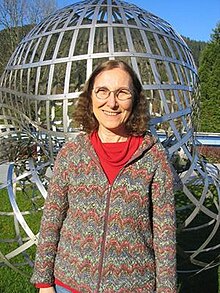Alicia Dickenstein
Alicia Dickenstein | |
|---|---|
 | |
| Born | 17 January 1955 Buenos Aires |
| Nationality | Argentinean |
| Alma mater | Universidad de Buenos Aires |
| Scientific career | |
| Fields | Algebraic Geometry and Nonlinear Algebra |
| Institutions | University of Buenos Aires |
| Doctoral advisor | Miguel E. M. Herrera |
Alicia Dickenstein (born 17 January 1955, in Buenos Aires) is an Argentine mathematician known for her work on algebraic geometry, particularly toric geometry, tropical geometry, and their applications to biological systems.[1] She is a full professor at the University of Buenos Aires,[2] a 2019 Fellow of the American Mathematical Society,[3] a prior vice-president of the International Mathematical Union (2015–2018), and a 2015 recipient of The World Academy of Sciences prize.[4]
Research
Dickenstein is editor-in-chief of the journal Revista de la Unión Matemática Argentina.[5] She is also a corresponding editor for the SIAM Journal on Applied Algebra and Geometry.[6]
In 2009-2010, Dickenstein was an Eisenbud professor at MSRI, and in 2012-2013, she was a Simons professor at MSRI.[7][8] In 2016, Dickenstein was a Knut and Alice Wallenbergs Professor at KTH.[9]
Her research focuses on using Algebraic geometry and combinatorics to predict behaviours of Biological systems without knowing precise parameters.[10] She in conjunction with Mercedes Perez Milian has created a system called The MESSI System (named after the footballer, Lionel Messi) which stands for Modifications of the type-Enzyme-Substrate or Swap with Intermediates. This allows researchers to prove general results valid in certain networks.[10][11]
Education
Dickenstein obtained her Ph.D. from the Universidad de Buenos Aires in 1982 under Miguel E. M. Herrera.[12][13]
Honors
In 2015, Dickenstein received the TWAS Prize from The World Academy of Sciences for the advancement of science in developing countries.
In 2018, Dickenstein was elected as a Fellow of the American Mathematical Society for "contributions to computational algebra and its applications, especially in systems biology, and for global leadership in supporting underrepresented groups in mathematics."
Children's Books
Dickenstein has produced several books for children, including Mate max: la matemática en todas partes, which presents mathematical problems designed for young children.[10]
References
- ^ Millán, Mercedes Pérez; Dickenstein, Alicia (2018). "The Structure of MESSI Biological Systems". SIAM Journal on Applied Dynamical Systems. 17 (2): 1650–1682. arXiv:1612.08763. doi:10.1137/17M1113722.
- ^ Dickenstein, Alicia (2018), Alicia Dickenstein Short CV (PDF), mathunion, retrieved 26 January 2019
- ^ Class of the Fellows of the AMS, accessed 26 January 2019.
- ^ "Prizes and Awards". The World Academy of Sciences. 2016.
- ^ "Editorial board", Revista de la Unión Matemática Argentina, retrieved 2018-08-08
- ^ "Editorial board", SIAM Journal on Applications of Algebra and Geometry, retrieved 26 January 2019
- ^ List of Eisenbud Professors, retrieved 26 January 2019
- ^ List of Simons Professors, retrieved 26 January 2019
- ^ Knut and Alice Wallenbergs Professor, retrieved 26 January 2019
- ^ a b c July 31; 2018; Pm, 1:39. "Alicia Dickenstein presents her "Messi" research | ICM News". Retrieved 2019-02-27.
{{cite web}}:|last2=has numeric name (help)CS1 maint: numeric names: authors list (link) - ^ Pérez Millán, Mercedes.; Dickenstein, Alicia. (2018-01-01). "The Structure of MESSI Biological Systems". SIAM Journal on Applied Dynamical Systems. 17 (2): 1650–1682. doi:10.1137/17M1113722.
- ^ Alicia Dickenstein at the Mathematics Genealogy Project
- ^ Newsletter European Mathematical Society June 2012 Issue 84
External links
- UBA – Alicia Dickenstein
- Alicia Dickenstein publications indexed by Google Scholar
